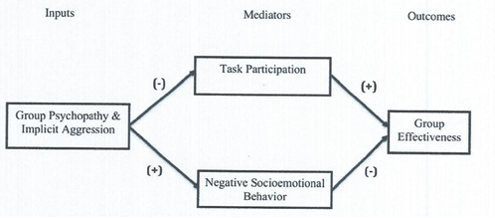P1029
Industrial-Organizational Psychologists have historically measured personality traits when examining the influence of psychological factors on work outcomes. However, as globalization and reliance on work groups increases, researchers are taking a more contextualized approach that considers the organizational impact of a range of neurological, psychological, and sociological factors on effectiveness at multiple organizational levels. A recent study was among the first to measure the impact of individual-level maladaptive psychological tendencies on group-level outcomes such as perceived and actual effectiveness. Mediational relationships were also examined; the theoretical model used in the study is shown in Figure 1.
Over 500 undergraduates in a Pre-Med program were placed in work groups and asked to complete 2 group problem-solving tasks. Participants completed measures of psychopathy and implicit aggression, which were aggregated to form a “group personality” variable. Participants also assessed group process factors, including individual participation in problem-solving tasks and the extent of negative socio-emotional behavior such as criticizing other’s suggestions that occurred during group interactions. Group effectiveness on the problem-solving tasks was calculated as the difference between participant and expert observer ratings. Hypotheses drawn from the theoretical model shown were partially supported, and all relationships were in the hypothesized directions. High levels of psychopathy and implicit aggression produced less task participation and more negative socio-emotional behavior. Task participation increased group effectiveness, and negative socio-emotional behavior reduced effectiveness. However, only negative behavior, not task participation, mediated the group personality-group effectiveness relationship.
Find an error? Take a screenshot, email it to us at error@mytestingsolution.com, and we’ll send you $3!

